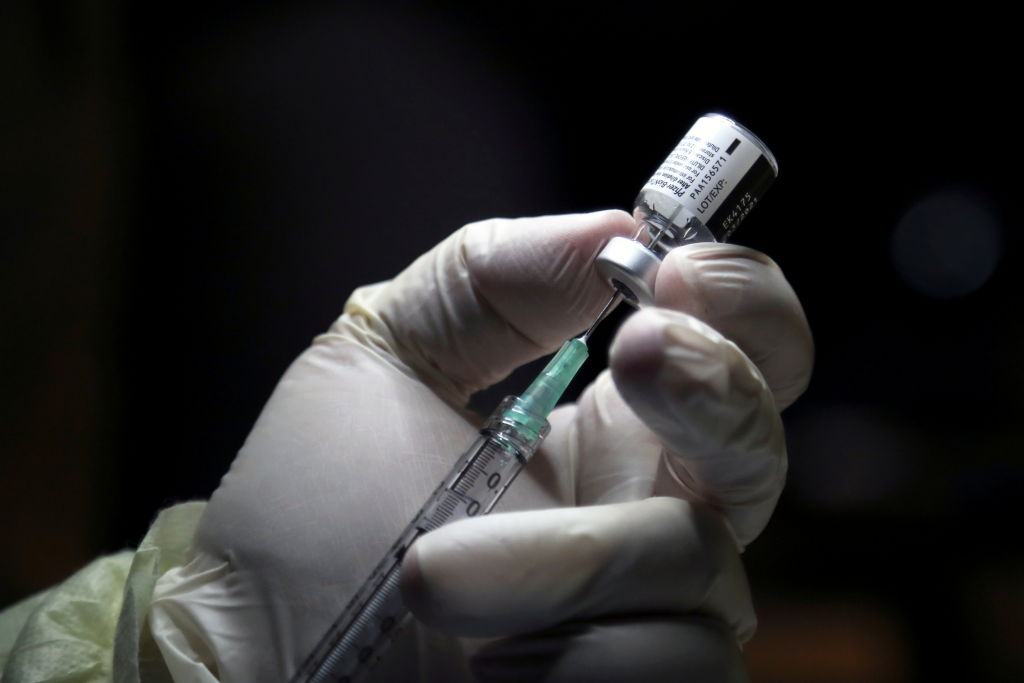Starting Friday, coronavirus vaccinations will be halted for at least two weeks at London’s Western Fair District Agriplex due to limited local stock and delivery delays of the Pfizer-BioNTech vaccine, officials with the London Health Sciences Centre (LHSC) and the Middlesex-London Health Unit (MLHU) said Wednesday.

In a statement, officials with the LHSC and MLHU said efforts to have all local long-term care home residents in London and Middlesex receive initial shots by the end of the week would still be completed with the use of remaining stock.
At the same time, given the limited local vaccine stock, and in keeping with direction from the province to focus on long-term care, the organizations said second doses of the vaccine for those not in long-term care who have already received a shot will be rescheduled to 42 days from the date of their initial dose.
The local developments come a day after federal officials said Canada would not receive any doses of the Pfizer-BioNTech vaccine next week, the result of production slowdowns at the U.S. drugmaker’s Belgium facility, where upgrades are being made to boost production capacity.
Canada’s shipments will “pick back up again” the first week of February, but details weren’t expected until Thursday, said Maj.-Gen. Dany Fortin, the military commander co-ordinating the vaccine rollout for the Public Health Agency of Canada.

Get weekly health news
Pfizer is also producing its vaccine in Michigan, but doses made in the U.S. are only being shipped within that country.
Prime Minister Justin Trudeau has said the temporary slowdown in deliveries would not affect Canada’s goal to vaccinate every Canadian who wants a shot by the end of September.

In a statement, LHSC COO Neil Johnson said the halting of vaccinations at the Agriplex, run in partnership with the health unit and in collaboration with Huron-Perth and Southwestern public health units, was “disappointing, but temporary.”
“We continue to advocate to the COVID-19 Vaccine Task Force for adequate supplies and we recognize that we are at the very early stages of the vaccination program in this community,” he said.
LHSC and MLHU officials say some 9,516 doses of coronavirus vaccine have been administered at the Agriplex clinic, located at the city’s field hospital, since it opened on Dec. 23, 2020. As of Jan. 11, the region’s vaccine supply has been solely prioritized toward long-term care residents and staff.
- Woman dies in ‘suicide pod’ in Switzerland, several people arrested
- Pfizer’s updated COVID-19 vaccine approved by Health Canada
- Canada’s new pandemic preparedness agency aims to speed up vaccine development
- After controversial directive, Quebec now says anglophones have right to English health services
Health unit teams have been visiting long-term care facilities in the region since then. As of Tuesday, nearly 1,500 doses had been distributed. The province has said it wants initial vaccinations in all Ontario long-term care and high-risk retirement homes by Feb. 15.
“Since the date and amount of the next shipment of vaccine is unknown at this time, eligibility criteria must be adjusted and second doses of vaccine rescheduled in order to ensure those who are most vulnerable continue to get vaccinated,” Dr. Chris Mackie, the region’s medical officer of health, said in a statement on Wednesday.
“While the delivery date for the next local shipment of the Pfizer-BioNTech vaccine still remains unclear, our goal remains to vaccinate all long-term care home residents by the end of this week.”
According to LHSC and MLHU officials, efforts will be made to get second doses to long-term care residents and staff within 21 to 27 days of their initial dose, should stock be available.
However, if supply issues continue, the second doses may also have to be scheduled up to 42 days after the initial dose.
Mackie has noted previously that some 60 per cent of deaths in the province have taken place at long-term care homes — facilities that represent less than 10 per cent of Ontario’s population — with many of the remaining deaths located at retirement homes.
In London-Middlesex, seniors’ facilities have been linked to 85 of the region’s 160 COVID-19-related deaths.
— With files from The Canadian Press













Comments